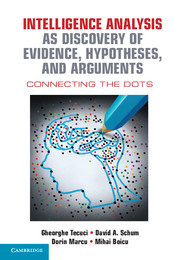Book contents
- Frontmatter
- Contents
- Preface
- Acknowledgments
- About the Authors
- 1 Intelligence Analysis: “Connecting the Dots”
- 2 Marshaling Thoughts and Evidence for Imaginative Analysis
- 3 Disciple-CD: A Cognitive Assistant for Connecting the Dots
- 4 Evidence
- 5 Divide and Conquer: A Necessary Approach to Complex Analysis
- 6 Assessing the Believability of Evidence
- 7 Chains of Custody
- 8 Recurrent Substance-Blind Combinations of Evidence
- 9 Major Sources of Uncertainty in Masses of Evidence
- 10 Assessing and Reporting Uncertainty: Some Alternative Methods
- 11 Analytic Bias
- 12 Learning and Reusing Analytic Expertise: Beyond Disciple-CD
- Glossary of Terms
- References
- Appendixes
- Index
4 - Evidence
Published online by Cambridge University Press: 05 August 2016
- Frontmatter
- Contents
- Preface
- Acknowledgments
- About the Authors
- 1 Intelligence Analysis: “Connecting the Dots”
- 2 Marshaling Thoughts and Evidence for Imaginative Analysis
- 3 Disciple-CD: A Cognitive Assistant for Connecting the Dots
- 4 Evidence
- 5 Divide and Conquer: A Necessary Approach to Complex Analysis
- 6 Assessing the Believability of Evidence
- 7 Chains of Custody
- 8 Recurrent Substance-Blind Combinations of Evidence
- 9 Major Sources of Uncertainty in Masses of Evidence
- 10 Assessing and Reporting Uncertainty: Some Alternative Methods
- 11 Analytic Bias
- 12 Learning and Reusing Analytic Expertise: Beyond Disciple-CD
- Glossary of Terms
- References
- Appendixes
- Index
Summary
WHAT IS EVIDENCE?
You might think that a section with this title is silly or unnecessary since everyone knows what evidence is. However, matters are not quite that simple since the term evidence is not so easy to define and its use often arouses controversy, especially in the field of intelligence analysis. One problem with definition of evidence is that several other terms are often used synonymously with it, when in fact there are distinctions to be made among these terms that are not always apparent. Quite unnecessary controversy occurs since some believe that the term evidence arises and has meaning only in the field of law. We will start with discussing these matters, since evidence is the foundation of all intelligence analyses.
We are actually not assisted very much in defining evidence by consulting a dictionary. For example, look at the Oxford English Dictionary under the term evidence and you will be led in a circle; evidence is ultimately defined as being evidence.
A variety of terms are so often used as synonyms for the term evidence: data, items of information, facts, and knowledge. When examined carefully, there are some valid and important distinctions to be made among these terms. First, consider the terms data and items of information. There are untold trillions of data or items of information in existence that will almost certainly never become evidence in any intelligence analysis or in most other inferences either. Here's a datum or item of information for you: Professor Schum has a long and steep driveway in front of his house that makes shoveling snow off of it very difficult in the winter. Can you think of any intelligence analysis problem in which this datum could become evidence? About the only matter in which this datum could become interesting evidence involves the question: Why did Schum and his wife, Anne, ever purchase this house in the first place? As we will discuss, data or items of information only become evidence when their relevance is established regarding some matter to be proved or disproved.
- Type
- Chapter
- Information
- Intelligence Analysis as Discovery of Evidence, Hypotheses, and ArgumentsConnecting the Dots, pp. 59 - 81Publisher: Cambridge University PressPrint publication year: 2016

